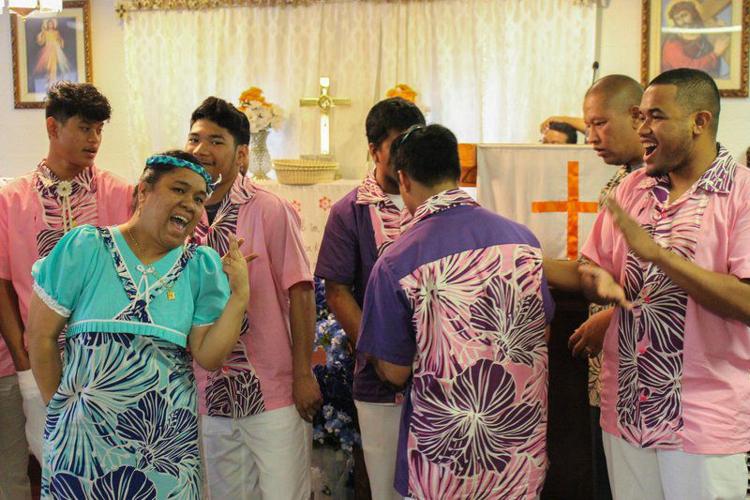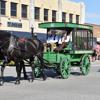ENID, Okla. — Cars park along 805 E. Cherokee outside Enid Marshallese United Church of Christ before the 10:30 a.m. Sunday service on April 2.
Children are playing in front of the white building as three bells ring to signify the service has begun. Inside, dozens of metal folding chairs are lined up behind pews, all of which sit facing pastor Alfred Alfred.
He’s standing at the podium with $5 bills taped across his neck like a sash — a tradition symbolizing his status within the community.
Alfred speaks in his native Marshallese tongue while preaching and leads the choir with translated hymns. All seats are taken, but some stand in the back corners of the room singing along. The Marshallese church is one of many in Enid, and serves as a common place for tradition, culture and gospel.
Nonresident aliens
The Marshallese community, originating from the Marshall Islands in the Micronesian region in the western Pacific Ocean, is largely unknown to Oklahoma, but is a familiar face to Enid, with a population of about 2,800 in Enid’s population of 50,000.
The United States and the Marshall Islands share a unique relationship through the Compact of Free Association (COFA), which was established in 1983, just three years before the Marshall Islands achieved independence as the Republic of the Marshall Islands.
Janet Cordell, Enid Community Clinic executive director, said the Marshallese began moving to Enid at about the same time as nonresident migrants.
“The Marshallese came here 35 years ago, probably,” she said. “I know why they came in the first place, and it’s because a couple of them were students.”
“Right about the time when they were doing all the nuking,” Cordell said.
The agreement was created as a compensation after the nuclear testing program took place from 1946 to 1958 in the Northern Marshall Islands, according to the agreement.
“I know why they’re here now, and it’s because of the shift work,” she said.
Marshallese find most employment opportunities at Walmart and AdvancePierre Foods, Cordell said, which recently was bought by Tyson Foods — a big employer for Marshallese residents in Springdale, Ark., which has a denser Marshallese population than Enid.
“I don’t really know why they stayed in the early days, but there was a very small presence,” she said.
“As the population grew, the churches emerged,” Cordell said.
“At some point in time … it has to be close to 30 years ago, they started a Marshallese Assembly of God. That was the first Marshallese church here,” she said.
Tight community
Ramson Malolo, 32, sits in the Marshallese United Church of Christ office, as music and singing from a traditional Biit dance can be heard through the walls.
Malolo, who grew up in the Marshall Islands, said the Marshallese who move to the U.S. come for education and a better economy, but the church is what keeps the community together.
He said it’s a place where culture survives as younger generations become more Americanized.
“The one thing we love to keep in our life is our culture, because it’s rare from any other,” Malolo said.
“You take Guam and you take the Marshall Islands; with Guam, they don’t have their culture, they’re losing their language,” he said.
“We’re still speaking our language, we’re still eating our traditional food, and I think most of the people who come from the Marshall Islands that have never been to the (U.S.), they don’t know how to maneuver or live here. They’re still adapting to that,” Malolo said.
‘Marshallese time’
Josana Samuel, 51, said it can take time for Marshallese to adapt to the American lifestyle.
“The only thing different about adapting to American culture, to me, is the money — financially. Back home, we live with a laid-back lifestyle. When we’re here, it’s the struggle: traffic, work, bills, everything,” he said.
“You work by the hour over here — back home it’s just sit back and relax all day long. There’s no planning, but it’s a small island. It’s island lifestyle. That’s also the Marshallese way,” Samuel said.
Geobi Batoong, 40, said one cultural difference is time.
“We’re good (at) working, only one problem: We call in too much. We’re always late because we go by ‘Marshallese time,’” he said.
When asked what “Marshallese time” meant, Batoong said while laughing, it means to “kick back and relax.”
Malolo, Samuel and Batoong said they each enjoy their lives in Enid.
“We don’t say United States — we say ‘Mainland’ because the United States has become our home away from home,” Malolo said.
Micronesian Coalition
More than adapting, a larger issue is a lack of health care services to the community, Terry Mote said. Mote works at Garfield County Health Department as a translator, working full-time as a contractor without benefits, he said.
“They knew that we had this minority population in Enid, but the biggest challenge is they don’t see many of them come to the health department. Whenever they’re sick, they visit the big hospital and (receive) big bills,” Mote said.
With help from Cordell, Mote started the Micronesian Coalition — a group dedicated to improving Micronesian people’s health and education in Oklahoma.
“A lot of our community that don’t have access to health care is because they are not a U.S. citizen. So many people don’t know where to get the resources or the help, because education is another reason (for the coalition),” Mote said.
He planned to make Micronesians heard by Oklahomans by hosting the second Micronesian Day at the Capitol on May 1, he said, but the plans fell through this year, Cordell said. She said there was some miscommunication for Mote, who was in charge of scheduling the day at the Capitol. The day would have shared Micronesian cultures, foods and dances, Mote said, but more importantly to bring health care issues to light.
“We narrowed down and we believe that, because many of us weren’t born in the states, if you are not a U.S. citizen in Oklahoma, you cannot access the health care or Medicaid, or state benefits,” Mote said.
Mote said through the Micronesian Coalition, he is outlining six areas which are considered issues for the community: education, health care, citizenship, civil issues, culture and politics.









Commented
Sorry, there are no recent results for popular commented articles.